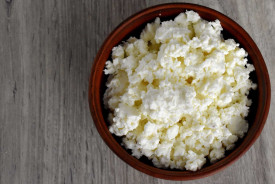In the past several years we’ve seen an unprecedented amount of debate as well as cooperative planning amongst governmental agencies, health researchers and healthcare providers, food industry interests, and many others to address concerns regarding the amount of salt Americans are consuming. The potential fallout, according to the CDC, of our national taste for salt includes hypertension (high blood pressure), “a major contributor to cardiovascular diseases, which are a leading cause of death, disability, and health-care costs in the United States.”
For cheese-makers this poses a few problems. The use of salt in cheese-making, a necessary part of the process, has been a focus in this debate. In cheese, salt “controls moisture, texture, taste, functionality and food safety.” Hence, a simple reduction in salt or finding a substitute for salt could compromise the product. Case in point, if a substitute was employed currently in making cheddar, the product would actually need to be renamed “Cheddar cheese product." Can the very nature or perception of a product change in the consumer's mind when a basic part of its composition is replaced or altered? Producers are weighing such questions as they push initiatives forward to look for healthier choices to offer the consuming public.
 The industry continues to look for answers; in the meantime, it is asking some tough questions. How much will a decrease of salt in cheese affect sales, product identity, and other considerations? How much of this initiative to curb salt comes from governmental and health agencies, producers, and consumers? What answers are the most logical and useful?
The industry continues to look for answers; in the meantime, it is asking some tough questions. How much will a decrease of salt in cheese affect sales, product identity, and other considerations? How much of this initiative to curb salt comes from governmental and health agencies, producers, and consumers? What answers are the most logical and useful?
Safety, taste, texture, and product identity are major points of concern for cheese-makers. Maybe the most immediate fear in the cheese industry is that there is little demand for reduced sodium cheese in the market. Low-sodium options have not sold well when they have been produced. Consumers, however, seemingly have no problem with buying naturally lower sodium cheeses like Swiss. When it comes to reduced-sodium varieties of the naturally more salty cheeses like cheddar, this is where consumers have not jumped on the bandwagon.
The invested parties mentioned above and others have been working to get the conversation out there and have engaged in the debate publicly, all with the hopes of finding a mutually beneficial answer. So what is the future of cheese going to be in the United States? Will this discussion on salt affect the food industry like whole grain initiatives did? Where will that leave the industry and the consumer? We would love to hear your thoughts on this issue. Feel free to post below and we’ll look forward to reading your perspectives.





